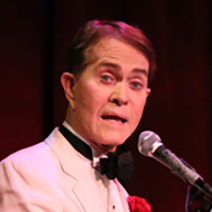Steve Ross
Steve Ross
Birdland, NYC, May 25, 2015
Reviewed by Alix Cohen for Cabaret Scenes
Steve Ross’s most recent show at Birdland shared a collection of his favorites, past and present. It included songs by Cole Porter, Noël Coward (nobody interprets these more authentically), and “Russia’s greatest export” Irving Berlin, as well as a sumptuous musical medley of Piaf songs, a number written for Eddie Cantor (trust Ross to unearth little gems), and a handful of more contemporary selections. Ross continues to define the word “brio.”
Through some kind of alchemy, he makes even that which is well known sound fresh. In a group of what he calls “people who are, how shall I say this, riddled with sophistication,” those familiar with classic material, the artist both elicits laughter and stills our hearts.
Part of this is sensitive comprehension of both lyrics and, more elusively, style. (Ross is an old soul.) Part is the excellence and originality of textural piano arrangements which embellish surely, but, subtly, and their adroit execution. Part is the infectious ardor with which he communicates, never, like Bobby Short, going over the top.
Opening with two by Berlin, Ross conjures Busby Berkeley production numbers. Next, is the Cantor ditty, “Hungry Women” (Milton Ager/Jack Yellen from Florenz Ziegfeld’s Whoopee ): “I feed ’em and weep/They never eat cheap….” He has a way with comic timing best described as “droll,” a lost sensibility. More Berlin includes a rendition of “I Love a Piano” which, Ross quips, was “written for me in 1915.” Several classical themes are embedded. “17 years of piano lessons and that’s all that’s left. I think it’s tragic.” Not.
The gift of being droll is further epitomized by “And Her Mother Came, Too” (Dion Titheradge/Ivor Novello) and “The Tale of the Oyster” (Porter), perhaps the only song that marries social climbing and fine dining. These require “aplomb,” another term I rarely use.
A trio of ‘60s/’70s songs features “99 Miles from L.A.” (Hal David/Albert Hammond), which I’d never thought anything more than pedestrian (no joke intended). Here, it’s almost tumultuous, heated by anticipation. The pianist’s right hand adds unexpected undercurrent.
And then there’s the waltzy “Time in a Bottle” (Jim Croce) which slows like a wind-up victrola, then quickens to the crank of an unseen hand.
Choices from the oeuvre of Fred Astaire arrive tart, besotted, or dancey—from the sumptuous, ballroom “(You’d Be So) Easy to Love” and “Cheek to Cheek” to a soft shoe “They Can’t Take That Away from Me,” during which one can practically hear the shhhhh of sand beneath feet.
His show recipe often places the mischievous after the stunning or vice versa. Several exhilarating Porters precede dark, galvanic selections from the artist’s Café Sabarsky show Mischa, Marlene, and Me: “(Don’t Put Your Daughter on the Stage) Mrs. Worthington” (Coward) is followed by the author’s “I’ll See You Again,” an immensely moving performance during which Ross’s tenor rends the heart; the jaunty “I Love a Piano” is tailgated by an interpretation of “What’ll I Do?” (also Berlin) which is wistful to the raw bone.
We’ve been in the company of a virtuoso.
Category: Cabaret Reviews, New York City, New York City Cabaret Reviews







